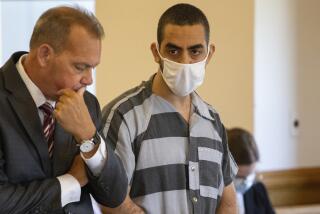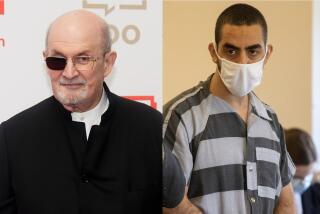Salman Rushdie’s Life on the Run
- Share via
LONDON — While their captors play with the lives of the hostages in Lebanon, another hostage to Islamic fundamentalism remains on the run, living underground in a prison without walls, serving a sentence with no end.
Author Salman Rushdie has not been seen publicly since British police bundled him and his wife into a car and sped off from their north London home on Feb. 14, following a death threat from Iran’s Ayatollah Ruhollah Khomeini. Since then, friends say, they have been moved at least 56 times and are never alone, always in the presence of at least one armed bodyguard.
Threat Still in Force
For nearly six months, Rushdie and his wife, American-born novelist Marianne Wiggins, have lived in limbo, the reluctant guests of Britain’s Special Branch security police, waiting for a reprieve that never came. Although Khomeini has since died, the death sentence he imposed on Rushdie for writing “The Satanic Verses,” a novel that the ayatollah and many other Muslims condemned as blasphemous, remains in full force.
A wall of secrecy surrounds the whereabouts and lives of Rushdie and Wiggins. He has issued only a few brief statements--one of which, expressing “profound regret” that the book had distressed Muslims, was immediately rejected by Tehran. Rushdie has granted no interviews.
But small glimpses of their existence have begun appearing in the British press in recent weeks, provided by friends who have had fleeting contact with the two fugitives. And last week, Wiggins broke her silence to give a brief interview to Lucy Hughes-Hallett of the Sunday Telegraph and mark the publication in Britain of a new edition of “Herself in Love,” a collection of Wiggins’ short stories.
“It’s a terribly frustrating, terribly lonely existence for them both,” said Lisa Appignanesi, a friend of Rushdie who has spoken to him on the phone in recent months and has co-edited a new book summarizing the events and furor surrounding his novel. “After a while you become a symbol of the issue at stake and people begin to forget that you’re also a human being living an incredibly difficult life.”
At first, the couple was allowed to live the semblance of a normal life. Accompanied by detectives, Wiggins returned to their home in the neighborhood of Islington to pick up clothes and books. There were also occasional dinners and social meetings at the homes of friends. At one, which reputedly took place at the London home of Michael Foot, a Labor Party member of Parliament, Rushdie dined with party leader Neil Kinnock.
But those occasions ended in late March at the insistence of Rushdie’s bodyguards, according to David Lister, arts writer for the Independent newspaper. Now there are no dinners, no trips to the supermarket or the movies, nothing that might endanger their lives or divulge where they are living.
Since then, the couple’s isolation has been all but complete. They receive mail and phone messages only through Rushdie’s agent, Gillon Aitken. He does not know where the couple is, but passes on material through the police.
Aitken’s standard response to reporters is this: “We really have no comment. The policy is simply not to speak and not to explain. I’m not allowed to say anything more.”
Wiggins had little more to say in her interview with the Sunday Telegraph. She said there were times when she and Rushdie do not have access to television, newspapers or the phone. In March, when an all-star lineup of American authors staged an all-night reading of “The Satanic Verses” to express their support, it was more than two weeks before the couple learned of the event.
What they do have are books. Wiggins said she and Rushdie have been reading works from the 18th-Century Enlightenment by Rousseau, Thomas Paine, Diderot and Voltaire. Rushdie reportedly has been working on a children’s book--the one thing that might escape the controversy that has plagued “The Satanic Verses.”
The flight into exile has been particularly hard on Wiggins, an author with a growing reputation here. As Lister points out, she spent the evening before the death threat at a lavish reception marking the publication of her new novel, “John Dollar.” She even insisted on attending a book signing at a London bookstore soon afterward but was forced to cancel an American publicity tour.
She told the Sunday Telegraph that she had no doubts about what she had to do. “If I weren’t married to him, if I didn’t know him, I would be signing petitions, I would be reading in public from his text, I would be picketing bookstores,” Wiggins said. “But I am married to him, and what I needed to do was to be with him to make his life go forward, and that meant I had to go into invisibility, too.”
Wiggins was reluctant to comment on the Rushdie affair itself. “Salman has, from the beginning, refused to enter into a debate because there’s no debate to be had,” she said. “A death threat is an ultimatum, not an argument. What is he supposed to do? To beg for his life? You can’t begin a discussion from such a debased level.
“We were as appalled and stunned and confused and gobsmacked (punched on the mouth) as anyone else. My visceral reaction to tyranny is the same as any rational thinker’s. I abhor it. But I didn’t have any kind of inside track for understanding it. I was just making decisions from day to day.”
Support From Muslims
Rushdie himself has had little to say since Khomeini scornfully dismissed his “apology” nearly six months ago. He issued a brief statement through a press conference held two weeks ago here by an international committee set up for his defense. He said he had received many letters of support from Muslims that showed the apparent gap between himself and the Muslim world was not unbridgeable and that some Muslims recognized the book was written within the Islamic tradition. As a result, Rushdie said, he was encouraged to hope for “mutual understanding and reconciliation” with his fellow Muslims.
Although Rushdie has all but disappeared, the controversy over the novel has not. Labor Party leader Kinnock’s statement of support for Rushdie’s right to publish brought a critical response from some other party leaders concerned that they might lose votes among their Muslim constituents.
Similarly, a BBC-TV broadcast earlier this week of a program entitled “Blasphemers’ Banquet,” a spirited defense of Rushdie by playwright Tony Harrison, brought condemnation from some Muslim leaders.
The broadcast was also criticized by the office of Robert Runcie, the archbishop of Canterbury, whose spokesman said he feared the program would damage “community relations” between Muslims and other Britons. “There are times when restraint should be exercised,” said John Lyttle, Runcie’s assistant.
More to Read
Sign up for our Book Club newsletter
Get the latest news, events and more from the Los Angeles Times Book Club, and help us get L.A. reading and talking.
You may occasionally receive promotional content from the Los Angeles Times.







